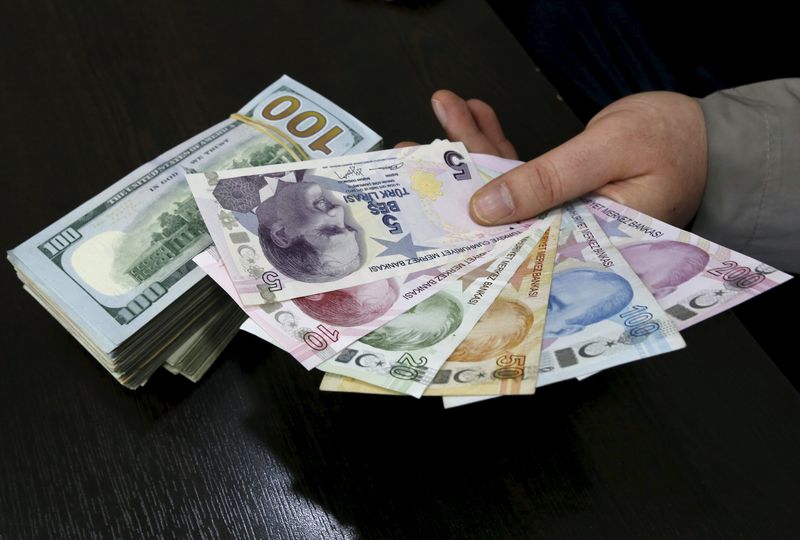* Graphic: World FX rates in 2018 http://tmsnrt.rs/2egbfVh
* Rouble extends drop to 4 percent after new U.S. sanctions
* Turkey's lira hits record low as U.S. tensions mount
* Oil steadies after swoon
* NZ dollar dives as central bank stays loose
* Pound stuck at 1 year low on Brexit concerns
By Marc Jones
LONDON, Aug 9 (Reuters) - Alarm bells were ringing on Thursday as new U.S. sanctions drove down Russia's rouble and worries that Turkey was sliding towards a full-blown economic crisis battered the lira. A rally in Chinese stocks had helped offset the latest escalation in the Sino-U.S. trade war overnight after Beijing matched the latest U.S. sanctions, but too much was going on nearby for Europe to remain unscathed.
London's FTSE .FTSE, Frankfurt's DAX .GDAXI and Paris' CAC40 .FCHI were down 0.7 percent, 0.3 percent and 0.4 percent respectively, while German government bonds rose in a broad grab for safety. GVD/EUR
Wall Street futures pointed to a steady start in New York but that was deceptive. The main fireworks were in the currency markets.
The Russian rouble sank after Washington said it would impose fresh sanctions because it had determined that Moscow had used a nerve agent against a former Russian agent and his daughter in Britain, something the Kremlin denies. were also reports of a new U.S. Senate bill that, if passed, would impose even more widespread punishments for meddling in U.S. elections.
The rouble slid to its lowest since late 2016, hitting 66.1 roubles to the dollar RUB= and leaving it almost 4 percent lighter than it had been 24 hours previously. surprised that the market, in retrospect, was quite complacent about this risk," said North Asset Management portfolio manager Peter Kisler, though he was relieved the new sanctions hadn't flagged a ban on Russian sovereign debt or banks for the time being.
Turkey's lira TRY= , bond and stocks markets were taking even more of a pounding after meetings between officials in Washington looked to have made little progress in mending a row over Ankara's jailing of an American pastor lira TRYTOM=D3 touched a record low of 5.44 against the dollar, weakening some 2.5 percent from Wednesday's close. There was widespread selling in the country's bond markets and Istanbul stocks dropped 1 percent too think Turkey may need to approach the IMF or seek other external support. Otherwise, capital-control measures seem to be a distinct possibility," said fund manager Lombard Odier's chief investment strategist, Salman Ahmed.
CHINA RALLY
Asia had been much brighter. Shanghai blue chips .CSI300 closed up 2.5 percent after talk of possible government support for home-grown technology companies, the latest in a series of growth-boosting measures rolled out by Beijing as the trade dispute worsens for more Chinese infrastructure spending underpinned industrial resources, including iron ore and copper.
The gains in Chinese stocks helped MSCI's broadest index of Asia-Pacific shares .MIAPJ0000PUS reverse early losses to gain 0.5 percent, though Japan's Nikkei .N225 slipped 0.2 percent, in part because core machinery orders fell in Mazda Motor Corp 7261.T , Suzuki Motor Corp 7269.T and Yamaha Motor Co 7272.T also fell on news they conducted improper fuel economy and emissions tests on their vehicles will try to avert steep tariffs on its car exports and fend off U.S. demands for a free-trade agreement at talks in Washington later on Thursday, China's state broadcaster said the country must counteract U.S. tariffs and that Beijing had the confidence to protect its own interests as well as the means to do so.
China had announced additional tariffs of 25 percent on $16 billion worth of U.S. imports from fuel to autos. The tariffs will apply to billions of dollars in U.S. gasoline, diesel and other oil products, though not crude. oil market took the news hard on Wednesday, suffering losses of more than 3 percent. O/R
Prices steadied a little on Thursday, with U.S. crude CLcv1 edging down 13 cents to $66.80 per barrel and Brent LCOcv1 flat at $72.27.
KIWI WOES
Back in the FX markets, it wasn't only emerging-market currencies that were struggling.
The pound wallowed at its lowest against the dollar and euro in almost a year as fears remained that Britain might leave the European Union without a deal on trade reported a significant increase in investors hedging against a no-deal Brexit, an event that could send sterling into free fall and hurt the economy by raising trade barriers with Britain's biggest export market.
Sterling was last trading at $1.2893 GBP= , having dropped 0.4 percent overnight.
The Japanese yen seemed to be catching a bid as a safe haven, with the dollar easing to 111.11 yen JPY= after stretching as high as 111.44 on Wednesday.
The euro EUR= was subdued at $1.1590, while the dollar index .DXY was up at 95.282.
The New Zealand dollar dropped 1.4 percent to a two-year low at $0.6641 NZD=D3 after the country's central bank pledged to keep rates at record lows well into 2020 risk of rate moves over the next 12 months is weighted more towards cuts than hikes, and financial markets will price the risk accordingly," said Kiwibank's chief economist, Jarrod Kerr.
"The good news here is interest rates and exchange rates will remain lower for much longer, assisting growth."
<^^^^^^^^^^^^^^^^^^^^^^^^^^^^^^^^^^^^^^^^^^^^^^^^^^^^^^^^^^^ Roasted Turkey
https://reut.rs/2Okt56X
^^^^^^^^^^^^^^^^^^^^^^^^^^^^^^^^^^^^^^^^^^^^^^^^^^^^^^^^^^^>
